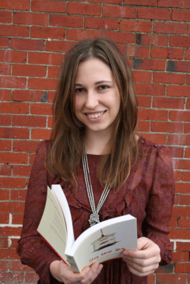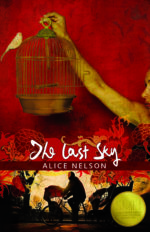Alice Nelson shortlisted for 2009 Barbara Jefferis Award

The Last Sky by Alice Nelson is one of six books on this year’s short list for the Barbara Jefferis Award.
Last weekend, the Australian Society of Authors announced the short list, which includes works by Geraldine Brooks, Helen Garner, Zacharey Jane, Toni Jordan and Joan London.
Valued at $35,000, the Award is offered annually for “the best novel written by an Australian author that depicts women and girls in a positive way or otherwise empowers the status of women and girls in society”.
The Award is paid from the Barbara Jefferis Literary Fund, established by a bequest from Barbara’s husband, ABC film critic John Hinde. Barbara Jefferis was a founding member of the Australian Society of Authors and its first woman President.
The Award judges were academic Dr Bernadette Brennan, author Nadia Wheatley and literary editor Susan Wyndham.
The shortlist is:
Geraldine Brooks, People of the Book (HarperCollins)
Helen Garner, The Spare Room (Text)
Zacharey Jane, The Lifeboat (University of Queensland Press)
Toni Jordan, Addition (Text)
Joan London, The Good Parents (Random House)
Alice Nelson, The Last Sky (Fremantle Press)
The winner will be announced on Friday, 27 March 2009. John and Barbara’s daughter, Rosalind Hinde, will present the award.
Alice Nelson is available for interview.
JUDGES’ SHORTLIST REPORT
The 2009 Barbara Jefferis Award received sixty-one entries, of which fifty-four were written by women. Twenty-five publishers were represented.
Entries included a variety of genre fiction (detective, romance, historical and fantasy novels) as well as literary fiction. In a few cases, the novel’s target audience was young adults.
The guidelines specify that, as well as demonstrating literary merit, the winning novel must depict women and girls in a positive way, or in a way that empowers the status of women and girls in society.
Evaluating the entries from this standpoint, it was somewhat surprising to find that many of the female protagonists appeared to have a poor self-image and little purpose in life, seeing themselves reflected primarily through their relationships with men. Characters frequently suffered illness, family and marital unhappiness, and abandonment. While some were oppressed by bullying and abuse, others lacked work and financial independence.
In this generally bleak context, ‘positive’ did not necessarily mean happy, successful or even lovable. However, the best books – including the six on the shortlist – feature strongly defined women and girls who drive the narrative and, at least to some extent, their own fates; characters who are individual, realistic, interesting, sometimes courageous, and who remain with the reader after the book is finished.
Above and beyond their subject matter, the six shortlisted books reach the high standard of literary merit that is one the key values of the Barbara Jefferis Award. It is pleasing to see three first-time novelists beside three experienced and internationally acclaimed authors.
SHORTLIST IN ALPHABETICAL ORDER
Geraldine Brooks: People of the Book (HarperCollins)
In this ambitious, assured narrative Geraldine Brooks sweeps across five hundred years of European history to trace the creation, ownership and preservation of a Jewish Haggadah. The protagonist Hanna is an intelligent, independent and somewhat abrasive Australian art conservator who pieces together the story of the book; a story that involves a cast of determined and dedicated women, from the Muslim girl who illustrated the book through to Hanna and her ambitious neurosurgeon mother. Along the way we are offered insights into the lives and burgeoning friendship of two brave young women caught up in war-torn Sarajevo: the Muslim Stela and Jewish Lola. By setting all these figures against an historical framework, Brooks writes an alternative, partly feminist and very human version of history, celebrating its minor, forgotten characters.
Helen Garner: The Spare Room (Text)
Like a Dutch interior painter, Helen Garner uses the small domestic scene of two women in one house over three suffocating weeks to illuminate the deep and sustaining nature of friendship between women. As the protagonist – also named Helen – faces the challenge of supporting her dying friend Nicola through a course of painful and patently futile alternative therapy, she is forced to confront herself as well as the death of her friend. Great dignity is afforded to the female body, even as it collapses out of control, and to Nicola, whose courage is unquestionable. The lean, spare prose avoids any hint of sentimentality, while moments of joy and humour shared by the two women are evoked with economy and precision.
Zacharey Jane: The Lifeboat (University of Queensland Press)
The Lifeboat is a lyric meditation on loss, memory, language and identity in which dream-like fable blends with a very human struggle against rigid bureaucracy. When an elderly man and woman, unnamed castaways, wash up on a vividly depicted yet unnamed ‘island nation’, a determined, young, multi-lingual interpreter defies the system in her attempt to help them recover their memory and identity. The narrative, told as reminiscence, moves between her quest and nightmare sequences of war and destruction, a structure that reveals poignantly fragmentary parallel stories of exile and abandonment. With a lightness of touch Zachary Jane offers both a hauntingly beautiful tale and a direct challenge to the Australian government’s policies of detention.
Toni Jordan: Addition (Text)
With humour and generosity, but no sentimentality, Toni Jordan creates the character of Grace, a young woman whose obsessive-compulsive disorder rules her life. Grace narrates her story with a credible and consistently wry voice, listing her habits of counting everything from toothbrush strokes to the number of poppy seeds on the cake she eats at the same time each day. Her childhood experience is lightly sketched in but doesn’t define Grace or produce an issue-dominated story. Grace is independent and when she finds love it is on her terms: she is at her best with all her idiosyncracies. Jordan writes with a fresh, confident, witty style that is perfectly suited to Grace’s engaging story.
Joan London: The Good Parents (Random House)
When eighteen-year-old Maya disappears, her family is left anxiously waiting and wondering. Her mother, Toni, also reflects with nostalgia and regret on her own youthful relationship with a mysterious, dangerous man. Their apparent passivity, we can decipher, expresses a need for adventure and risk, which continues into adulthood; yet nothing is overstated. Joan London intricately weaves the stories of this mother and daughter with that of their wider family and shows clear-eyed sympathy for all, from the husband and son to Kitty, a warm but emotionally worn aunt, and Cecile, Maya’s vibrant friend. London’s writing has moments of fine lyricism but is always grounded in reality and she has easy control of the novel’s complex structure of shifting place, time and perspective.
Alice Nelson: The Last Sky (Fremantle Press)
In delicate fragments of assured prose, first-time novelist Alice Nelson adeptly moves between two historically significant timeframes, as young Australian exile Maya Wise – adrift in a failing marriage in Hong Kong at the time of Handover – explores and refracts the story of a Chinese man’s love for a Jewish refugee in wartime Shanghai. The author’s vivid sense of place transports the reader not only into the external world of the two Asian cities but also into the confined, sometimes claustrophobic, spaces of the protagonist’s interior life. When a sense of political reality pierces Maya’s dream-live sensibility, she finds her independence and begins the journey home, to herself.



